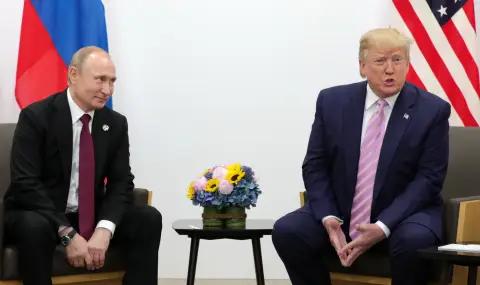The phone call between US President Donald Trump and his Russian counterpart Vladimir Putin lasted an hour and a half, and the head of Russian foreign intelligence Sergey Naryshkin described it as "deep and significant". Shortly before this, US Secretary of Defense Pete Hegsett had informed NATO partners about the new US policy towards Ukraine. And last week, the Ukrainian news portal strana.today revealed details about an alleged US plan to end the war in Ukraine within 100 days. The question is how the Trump administration imagines peace in Ukraine. Here we summarize what is known so far.
Ceding of territories in favor of Russia
If the information provided by strana.today is to be believed, a ceasefire should be concluded in Ukraine by April 20, which will freeze the front line in Eastern Ukraine. The alleged plan to end the war within 100 days also calls for Ukrainian troops to withdraw completely from the Russian Kursk region. Ukrainian President Volodymyr Zelensky must be forced to recognize Russian sovereignty over the Ukrainian territories occupied by Russian troops.
Zelensky himself has so far rejected such an option. But this fits perfectly with what Pentagon chief Hegsett said at the NATO-Ukraine Contact Group meeting that returning to Ukraine's pre-2014 borders, i.e. before Russia's annexation of the Crimean peninsula, is "unrealistic", "will only prolong the war" and "will cause even more suffering". That is why it is very likely that the US will ask Ukraine to officially recognize the territories seized by Russia.
European buffer zone, no NATO membership
According to Hegseth, a lasting peace must include "solid security guarantees to ensure that war does not break out again". He believes that this should be carried out by "combat-ready troops from Europe or outside Europe", and according to the Ukrainian website strana.today, these troops should monitor a demilitarized buffer zone along the frozen front line.
US troops in Ukraine are not an option for the Trump administration. NATO is also not a suitable partner for the deployment of peacekeeping troops, and therefore they should be organized "outside the Alliance," Hegseth said, without specifying exactly how this could be achieved.
"The"solid security guarantees" mentioned by the Pentagon chief clearly exclude Ukraine's membership in NATO. Most likely, this will result in strict neutrality for Ukraine.
Putin is "open to negotiations", Zelensky is "cautiously optimistic"
After the phone call with Trump, the Russian leader expressed his readiness to participate in peace talks. Ukrainian President Zelensky, with whom Trump also spoke afterwards, demonstrated cautious optimism and in turn insisted on lasting guarantees for his country's security.
According to strana.today, the first direct talks between Putin and Zelensky will take place around March 1, and in the near future Trump would also organize an international peace conference to work out the details of a lasting peace solution. A detailed peace plan should be prepared by May 9, the website specifies. Trump himself, meanwhile, announced that he wanted to meet with Putin in Saudi Arabia "in the near future."
The US allies in NATO were completely surprised by the actions of Trump, who apparently did not coordinate his phone call with Putin with them. His European partners were expecting to learn details about the peace plan at the Munich Security Conference.
It seems that Trump's plan envisages the Europeans covering the majority of the costs of rebuilding Ukraine, amounting to nearly 500 billion US dollars, as is clear from the information provided by the website strana.today. At the same time, it is not at all clear how much freedom Trump will give the Europeans in making decisions.
"Putin is winning the war"
A number of Western and Ukrainian security experts criticize Trump's plan, as it represents a retreat from many of the West's previous positions on the war in Ukraine - and a retreat in favor of Russia. German military expert Carlo Massala, for example, stated that in this situation Putin is winning the war, as he has managed to get the Americans to withdraw from this military conflict.
"This is an apocalyptic scenario. The negotiations are being conducted through the heads of the Ukrainians and the Europeans. The EU will have no place at the negotiating table, it will only have to approve the final result. The same seems to apply to Ukraine," says Masala. "Just as we had no strategy for this war for three years, we now have no strategy for its consequences. This is bitter. This is a huge failure," the analyst adds.
Former Russian diplomat Boris Bondarev, who is now an outspoken critic of Putin and lives in exile, also issued sharp criticism. "Trump wants to end the war quickly by giving Putin what he wants. But Trump and his closest associates have no idea what Putin is like," warns Bondarev.
From this perspective, the date of May 9, when, according to the information reported by strana.today, there should be a final peace plan for Ukraine, should also be viewed critically. In Russia it is celebrated as "Victory Day" - over Nazi Germany.
Author: Thomas Lachan
